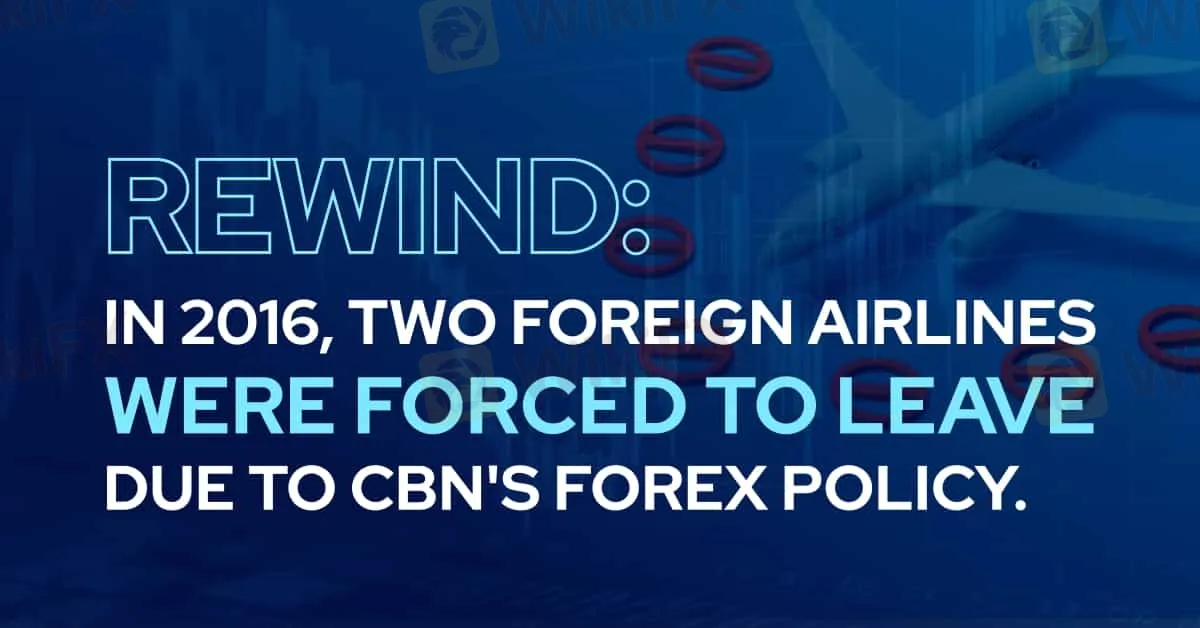简体中文
繁體中文
English
Pусский
日本語
ภาษาไทย
Tiếng Việt
Bahasa Indonesia
Español
हिन्दी
Filippiiniläinen
Français
Deutsch
Português
Türkçe
한국어
العربية
REWIND: IN 2016, TWO FOREIGN AIRLINES WERE FORCED TO LEAVE DUE TO CBN'S FOREX POLICY.
Abstract:In 2015, the Central Bank of Nigeria (CBN) implemented a fiscal policy that prohibited the transfer of funds outside the nation and placed restrictions on 41 products. Since then, airline cash has been stuck in banks as a result of this limitation.

In 2015, the Central Bank of Nigeria (CBN) implemented a fiscal policy that prohibited the transfer of funds outside the nation and placed restrictions on 41 products. Since then, airline cash has been stuck in banks as a result of this limitation.
In 2022, the International Air Transport Association (IATA) first listed Nigeria as the country with the biggest foreign airline debt in the world.
Nigeria kept its position the next year, with debt amounts increasing to $783 million in August 2023 from $515 million. Due to the 2015 policy, Nigeria currently owes foreign airlines over $800 million in detained funds.
A $61.64 million payment to the airlines via deposit money banks (DMBs) was announced by CBN on January 7. The payment was made as part of the apex bank's attempts to pay off the country's backlog of trapped foreign exchange that was owing to foreign airlines.
The Association of Foreign Airlines and Representatives (AFARN), in response to the payment on Sunday, stated there was no cause for celebration.
The association's president, Kingsley Nwokoma, clarified that if the situation was not rectified, big airlines might altogether stop offering their services.
“The government should agree on the quarterly payment of these funds by sitting down with the foreign airlines in the same manner that you sign your BASA agreements.” Would the government kindly adhere to that understanding? We will be moving forward by then, Nwokoma said.
Nwokoma is not bluffing in her assertion. For example, two significant international airlines left Nigeria between 2016 and 2024 because they were unable to send money home. FIJ examines these exits and the conditions that surround them.
2016: 14 SUSPENSIONS, 2 EXITS
After pausing operations for around three weeks, Spanish airline Iberia Airlines suspended its flights from Nigeria in May 2016. The airline said that declining passenger traffic and—above all—trapped revenue were the reasons behind its withdrawal.
The airline stated that more than $500 million was held by Nigerian banks, even though it had only been in operation for two years.
United States Airlines left the Nigerian market approximately one month after Iberia did. Similar to Iberia, United Airlines gave two main explanations for leaving, one of which being the unstable nature of the energy industry.
The primary cause, however, was United Airlines' incapacity to transmit money from banks throughout Nigeria because of the CBN foreign exchange policy.
The Guardian revealed in that same year that trapped income forced no fewer than 14 airlines to halt operations in Nigeria. According to estimates at the time of the August Guardian story, the policy had cost airlines N64 billion.
EMIRATES AIRLINES CEASED OPERATIONS IN 2022.
The airline Emirates Airlines was unable to repatriate approximately $85 million of its foreign exchange earnings from Nigeria, therefore it decided to halt operations there in September 2022.
The airline claims that it took this action to lower losses and lessen the effect that the Nigerian market had on its operating expenses.
“The backlog will continue to grow, and we simply cannot meet our operational costs nor maintain the commercial viability of our operations in Nigeria without the timely repatriation of the funds and a mechanism in place to ensure that future repatriation of Emirates funds does not accumulate in any way,” the airline stated.
A plan from the Nigerian government guaranteeing a gradual return of their funds was one of the requirements they set for the restart of operations. In addition, they insisted that before the end of the next month, the CBN release at least 80% of their withheld wages.
Despite returning to flight ten months after being suspended, there are no indications that Emirates Airlines has received its money back from the CBN.
Stakeholders: The Aviation Sector Will Suffer As a result
Experts have forecast catastrophic outcomes if further international airlines decide to leave the nation due to embezzled revenues.
According to Wole Oyebade of Guardian Nigeria, the annual cost to the Nigerian aviation industry would be approximately $1.36 billion. Oyebade added that if these foreign airlines demanded payment in US dollars, their departure may devalue the naira even more.
The head of IATA for the Africa and Middle East, Kamil Alawadhi, stated that investor trust in Nigeria was seriously jeopardized by the debt. He claimed that the exits had the power to drastically reduce foreign direct investment in Nigeria.
The CBN overturned the FX bank's policy decision in October 2023. Nonetheless, among other businesses, the aviation sector continues to bear the weight of the guidelines. Stakeholders predict that if the problem is not resolved permanently, Nigeria's aviation sector will completely collapse.

Disclaimer:
The views in this article only represent the author's personal views, and do not constitute investment advice on this platform. This platform does not guarantee the accuracy, completeness and timeliness of the information in the article, and will not be liable for any loss caused by the use of or reliance on the information in the article.
Read more

Grand Capital Doesn’t Feel GRAND for Traders with Withdrawal Denials & Long Processing Times
The trading environment does not seem that rosy for traders at Grand Capital, a Seychelles-based forex broker. Traders’ requests for withdrawals are alleged to be in the review process for months, making them frustrated and helpless. Despite meeting the guidelines, traders find it hard to withdraw funds, as suggested by their complaints online. What’s also troubling traders are long processing times concerning Grand Capital withdrawals. In this Grand Capital review segment, we have shared some complaints for you to look at. Read on!

ADSS Review: Traders Say NO to Trading B’coz of Withdrawal Blocks, Account Freeze & Trade Issues
Does ADSS give you plenty of excuses to deny you access to withdrawals? Is your withdrawal request pending for months or years? Do you witness account freezes from the United Arab Emirates-based forex broker? Do you struggle to open and close your forex positions on the ADSS app? Does the customer support service fail to respond to your trading queries? All these issues have become a rage online. In this ADSS Broker review article, we have highlighted actual trader wordings on these issues. Keep reading!

INGOT Brokers Regulation 2025: ASIC vs Offshore License - What Traders Must Know
Explore INGOT Brokers regulation in 2025: Compare their ASIC and Seychelles FSA licenses, understand trader protection levels, and learn about potential risks in this detailed guide.

INGOT Brokers Review 2025: High Risk or Hidden Gem? Expert Analysis Reveals All
Comprehensive INGOT Brokers review exploring the broker's mixed reputation in 2025. Discover the truth about regulation, trading options, and user experiences before opening an account.
WikiFX Broker
Latest News
Consob Targets Political Deepfake “Clone Sites” and Unlicensed Platforms in Latest Enforcement Round
WikiEXPO Global Expert Interviews: Gustavo Antonio Montero: ESG in Finance
Global Guide to Finding Forex IBs/Brokers — Share Your Pick and Win Big!
Trump tariffs are helping drive U.S. beef prices to new highs
Mitrade Arabic Platform Targets MENA Gold Trading Boom
Israeli Arrested in Rome Over €50M Forex Scam
Scam Alert: GINKGO-my.com is Draining Millions from Malaysians!
New FCA Consumer Alert 2025: Important Warning for All Consumers
EmiraX Markets Withdrawal Issues Exposed
Trading Pro Review: Scam Broker Exposed
Currency Calculator



